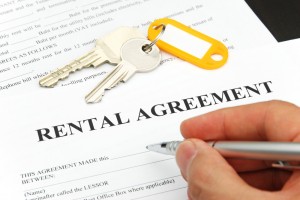A room share (leasing a room in someone’s house) can be cheaper for a tenant than leasing his or her own apartment. And a bit more beneficial.
If you’re seeking a room share (whether to rent a room in someone’s house, or, as the owner, to lease out a room in your home), it may seem easy enough to broker a deal that decides who cooks in the kitchen when, what days visitors can come or go, or how late to use the laundry room. But not every room in a house is necessarily a legal rental. Here are 5 tips to help you discover if that room share situation is really legal.
 #1 Separate rental unit.
#1 Separate rental unit.
If the room you’re renting is really a legally divided apartment (such as a mother-in-law’s suite, or a carriage house) with its own plumbing, separate entrance, that has a legal permit to operate as separate dwelling, then you’re safe, as this is not a room share, but a separate rental apartment.
#2 Occupancy laws.
Check with your local Tenants Union or City Hall to determine if your area has any rules about how many non-blood-related individuals can live under one roof. In some areas, only relatives can share a space. In some others, perhaps no more than two unrelated people can live together. In addition, almost every city has ordinances that limit how many people can live per square feet. Sharing 400-square-feet with three adults just might not be legal. As the landlord, violating city ordinances could cost you a fine, jail time, or even cost you your mortgage, depending on if it has a balloon clause based on illegal activities in the home.
#3 Fire safety.
City ordinances and building codes determine the minimum dimensions of a window that must be in a room in order for it to be considered a legal bedroom. Typically, the window has to be of an average size to allow for escape in the event of a fire or other home emergency. If the room share room lacks windows, then it is likely not a legal rental. If it has only transom windows above a door, this would not make it legal. In some areas, a typical egress window found in many basements will suffice for basement level living, but might be too small of a dimension for an upper level room.
#4 Plumbing.
Legal units have to have access to operational plumbing, including fresh running water. Even if there is standard plumbing in the house, but it is off limits to the tenant, then you’re likely to find that this is not a legal room rental.
#5 Security.
You might think that a double deadbolt lock (keyed on both sides) is added security and wouldn’t be a problem. But in reality, in some cities doors on a room must be able to be opened from the inside with the flip of a lever and not the turn of a key.
In summary, you want to make sure that the rental meets all health, safety and security concerns (including firewalls, heating and insulation). When in doubt, turn to your local tenants association for advice.

